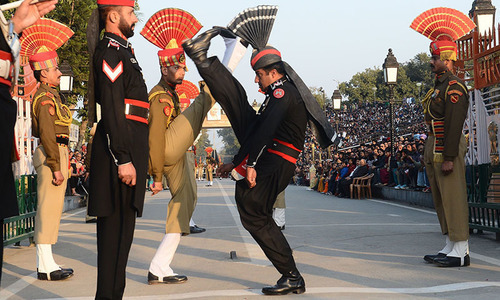Chief of Army Staff (COAS) Gen Qamar Javed Bajwa witnessed the "training launch" of short-range surface-to-surface ballistic missile 'Nasr' on Wednesday.
Nasr is a high-precision weapon system with the ability to be deployed quickly, the military said.
"Pakistan has successfully undertaken a series of training launches and tests and trials during the current week for validation of new technical parameters of 'Nasr' with enhanced range from 60 km to 70 km and flight maneuverability," the military's media wing, Inter-Services Public Relations (ISPR), said in a tweet announcing the successful launch of the missile.
The ISPR said the weapon system will "augment credible deterrence against the prevailing threat spectrum" more effectively, including anti-missile defenses deployed by hostile forces.
"Nasr has put cold water on [the] Cold Start [doctrine]," Gen Bajwa said.
Bajwa was reported to have said that war must be avoided at all costs and that the Army's strategic capabilities were a "guarantee of peace" against a "highly militarised and increasingly belligerent neighbour".
"Pakistan will go to any length to ensure regional peace and stability," Gen Bajwa said. "We wholeheartedly support all government efforts at peace through dialogue. Our capability is only meant to ensure [peace]; no one thinks war remains an option," he assured.
The COAS was reported to have congratulated the scientists and engineers on the milestone.
He also expressed his complete confidence in "effective command, control, safety and security of all strategic assets and measures being taken to augment these."
"You are our real heroes — the unseen. We owe you our gratitude," the Army chief was quoted as saying.
Director General Strategic Plans Division Lt Gen Mazhar Jamil, Commander Army Strategic Force Command Lt Gen Mian Muhammad Hilal Hussain, NESCOM Chairman Dr Nabeel Hayat Malik, scientists and engineers of strategic organisations also witnessed the launch.
The Cold Start doctrine
Cold Start doctrine is reportedly the name given to a limited-war strategy designed by India to seize Pakistani territory swiftly without, in theory, risking a nuclear conflict.
It presupposes that India can cross the international border, temporarily hold Pakistani territory and launch punitive military strikes against military and militancy targets without triggering a general conflict.
Officials and experts have repeatedly said that Pakistan views India’s cold start doctrine as a real threat to its security and is unwilling to give up the defensive mechanism it has built to counter this threat.
India’s Cold Start doctrine, and the tactical weapons that Pakistan has made to counter this threat, drew international attention last year when former US president Barack Obama mentioned them at a news conference following the Nuclear Security Summit in Washington.
President Obama had expressed concern over a rapid increase in “small tactical nuclear weapons, which could be at greater risk of theft”.
“President Obama indirectly vindicated Pakistani position that Cold Start exists and it is a move in the wrong direction,” said a Pakistani nuclear expert while responding to the US leader’s statement.
India too possesses short-range tactical nuclear weapons like Prahaar and Pragati. Prahaar — with 150km range — was tested two months after Pakistan first developed Nasr.
Another Pakistani expert explained that the Cold Start doctrine or the proactive operations strategy, as India now preferred to call it, was not a putative or ‘hypothetical’ theory.
“It’s neither merely a concept nor a myth. It is an operationalised reality that has compelled Pakistan to take suitable deterrence measures,’ he had explained.














































